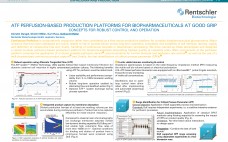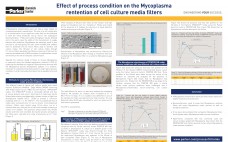Since the late 1980s, studies have shown that plants can manufacture functional transgenic pharmaceutical compounds. Advantages attributed to plant-made pharmaceutical (PMP) approaches are compelling, and PMP production continues to attract interest from investors and the biopharmaceutical industry (Table 1). Proposed PMP benefits include proven scalability, high production capacity, limited exposure to human or animal pathogens, lower capital expenditures (CapEx), and decreased operating costs. Those putative advantages have proven to be significant business forces driving continued investor support for PMP ventures.…
Upstream Processing
Noninvasive Optical Sensor Technology in Shake Flasks
In process development, appropriate scaling is important to achieve acceptable product quality without compromising titer (1). Scale-down approaches involve matching the oxygen transfer coefficient (kLa) value, impeller tip speed, power per unit volume, or mixing time to those of a bioreactor (2). Bench-top bioreactors are typically used in bioprocess engineering as scale-down models of commercial units in fermentation and cell culture because of their similarity in geometry (H/D ratio) and mechanical properties (agitation type and sparging). By contrast, shaking culture…
Rapid Production of Functional Proteins of a Combinatorial IgG Library in CHO Cells
Recombinant DNA (rDNA) technologies provide a wide range of tools for producing a broad array of recombinant proteins. Since the early 1970s, the biotechnology industry has harnessed those tools — together with genetic engineering and genomics — for developing new classes of innovative and effective therapeutic molecules. The therapeutic recombinant protein market segment now represents the core of the medical biotechnology industry, with hundreds of companies involved in discovery, development, and marketing. Although recombinant technologies are extremely powerful tools, significant…
Differential Cell Culture Media for Single-Cell Cloning
Recombinant therapeutic protein production using cell culture systems is a US$70 billion market. Most biotherapeutic proteins, including monoclonal antibodies (MAbs), are produced in Chinese hamster ovary (CHO) cells, which can generate the posttranslational modifications required for full biological function. Single-cell cloning is an important step in generating homogenous recombinant protein-producing mammalian cell lines. Recent advances in media development technologies have enabled limiting dilution cloning (LDC) and protein production in a serum-free environment to meet regulatory requirements. LDC…
Efficient Production of Recombinant Antibody Derivatives in Pseudomonas flourescens
P. fluorescens serves as an attractive expression host for the production of stable and biologically active antibody fragments. A proprietary strain of P. fluorescens has been specifi cally developed as a protein production platform to enable rapid identification of strains capable of expressing high titers of soluble, active protein, and refl ects the additional sophistication required of engineered antibody derivatives being developed today. PfÄ“nex Expression TechnologyTM employs a toolbox of defined P. fluorescens strains containing custom-designed combinations of genetic elements…
Performing Quality by Design on hydrolysates: a DOE case study
Hydrolysates provide increased cell growth and titers. The aim of FrieslandCampina Domo is to re-define hydrolysates and re-design their quality profile. The Quality by Design concept as put forward by the FDA proves to be an excellent framework for achieving these goals. In addition it will also enable FrieslandCampina Domo to provide a Design Space of this critical raw material for the biopharmaceutical industry and so making process changes easier and cost effective. FrieslandCampina Domo has analysed protein hydrolysates at…
ATF Perfusion-based Production Platforms for Biopharmaceuticals at Good Grip – Concept s for Robust Control and Operation
Continuous Perfusion is comparatively unpopular rather than considered as a first choice production platform for complex biopharmaceutical glycoproteins. Major concerns that have been addressed are mainly related to risk of process failure during long-term operation, complexity and scalability of cell retention devices, supply and definition of consecutive lots and, finally, handling of continuous harvests in downstream processing. We have cleared-up these stereotypes and designed a robust modular perfusion-based production platform for biopharmaceuticals demanding highest quality at industrial scale. Main components…
Towards the Use of Statistical Modeling to Predict Cell Culture Performance of Hydrolysates
Hydrolysates are complex media supplements composed of many as well as different types of components. Predicting cell culture performance of a particular lot remains an elusive target, other than by small scale cell culture testing which consumes valuable time, effort and resources. In order to reduce the need for incoming acceptance tests by our customers, FrieslandCampina Domo plans to develop a simple analytical assay that accurately predicts cell culture performance. Our Quality by Design project has provided information at the…
Effect of process condition on the Mycoplasma rentention of cell culture media filtersMethods
A Mycoplasma contamination event can have a major impact on a biopharmaceutical manufacturer. The loss of a cell culture due to a contamination incurs significant costs that can be attributed to both the initial bioreactor set-up and to the subsequent decontamination. Production facility throughput may be affected and in the worst cases the ability of the manufacturer to supply patients with medicines. Mycoplasma are extremely small in size and lack a cell wall giving the cells some flexibility that enables…
Trends in Perfusion Bioreactors
Single-use bioprocessing equipment has come to thoroughly dominate precommercial biopharmaceutical production in only a decade. Yet even with this breakthrough, performance and cost pressures on biopharmaceutical facilities continue to grow. Demands for greater productivity, more efficiency, and lower costs are resulting in an unrelenting push for upstream improvements. Some people in the industry are predicting that perfusion bioreactor technologies may be the next revolution in bioprocessing (1). Perfusion may possibly become a dominant single-use bioreactor technology, with fed-batch…





